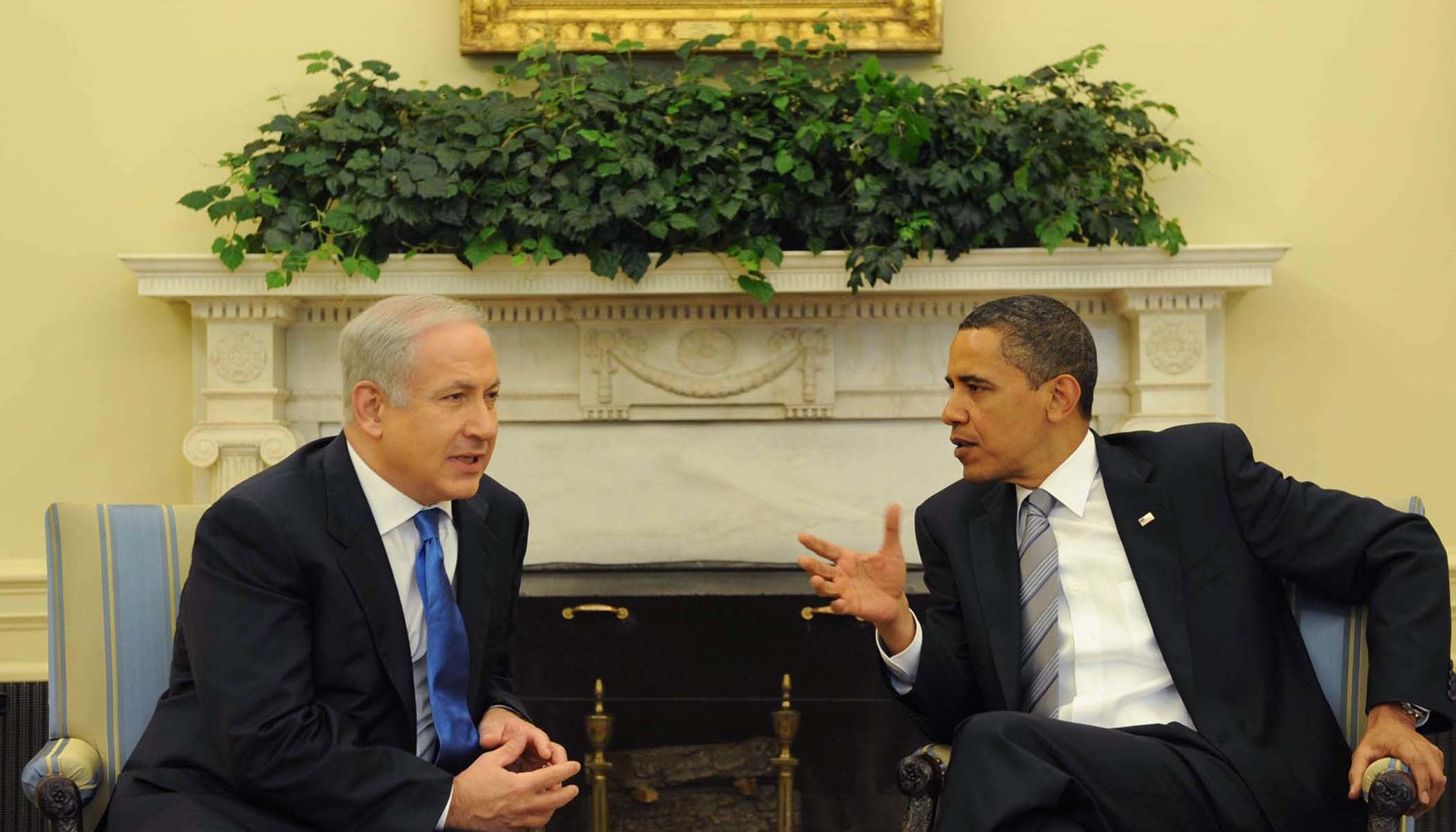
President Barack Obama talks with Israeli Prime Minister Benjamin Netanyahu outside the South Portico following their meetings at the White House Monday, May 18, 2009.
(White House Photo by Lawrence Jackson)

President Barack Obama and Israeli Prime Minister Benjamin Netanyahu at their working lunch in the Old Family Dining Room of the White House on May 18, 2009. (Official White House Photo by Pete Souza)

President Barack Obama and Israeli Prime Minister Benjamin Netanyahu chat in the Oval Office on May 18, 2009. (Official White House Photo by Pete Souza)

President Barack Obama makes a point to Israeli Prime Minister Benjamin Netanyahu, center, and White House Chief of Staff Rahm Emanuel in the Oval Office on May 18, 2009. (Official White House Photo by Pete Souza)

President Barack Obama escorts Israeli Prime Minister Benjamin Netanyahu to his car following their meetings at the White House on May 18, 2009. (Official White House Photo by Pete Souza)
WASHINGTON (JTA) — Not even 24 hours had passed and already the Obama-Netanyahu summit was assuming Rashomon-type qualities, with partisans reading their own fears and beliefs into the encounter.
The phenomenon is especially pronounced among Jewish groups: Americans for Peace Now praised President Obama for saying he would “aggressively” pursue peace and calling for a stop to settlements, and its sister dovish group, Brit Tzedek v’Shalom, said it was relieved to see an end to what it called the Bush administration’s “ruinous” hands-off approach.
At the other end of the spectrum, StandWithUs, which promotes hard-line pro-Israel views on U.S. campuses and is behind a campaign urging Obama not to pressure Israel, said its take from the summit was that it was “about terrorism and not territories.”
In the establishment center, the American Jewish Committee and the Anti-Defamation League released statements praising the leaders for reaffirming the “special relationship” between Israel and the United States.
The centrist groups, dedicated to bridging both nations, are deeply invested in the notion of smooth sailing, but it might yet prove to be wishful thinking.
Netanyahu secured a significant agreement from Obama to review his Iran outreach policy by the end of the year, but substantial differences emerged over the urgency of advancing talks with the Palestinians.
The Israeli media, which closely monitor the relationship between Israeli prime ministers and U.S. presidents, was blunt. “Agreed Not to Agree” and “Disagreements and Smiles” headlined the mass circulation Yediot Achronot. “Disagreements” and “With Mixed Feelings” echoed its competitor Ma’ariv.
The negative coverage infuriated Netanyahu and his aides, who fear nothing more than the disastrous first months of his 1996-99 prime ministership, when he alienated Bill Clinton by cultivating the then-president’s political enemies. That approach helped doom Netanyahu’s electoral chances three years later.
Netanyahu convened a last-minute news conference Tuesday on Capitol Hill following his meetings with leaders of the U.S. Senate and House of Representatives. Staffers for House Speaker Nancy Pelosi scrambled to find a room for Netanyahu and watched nervously as Israeli reporters jostled one another around antique chairs and tables.
The Israeli leader sauntered in and said he would take no questions.
“I had important conversations with President Obama,” Netanyahu said.
“The central understanding with President Obama is important to the State of Israel, and that is that Israel and the United States agree eye to eye that Iran must be not be allowed to develop a military nuclear capability,” he said. “The president made clear that he would take all steps to ensure this outcome. I think that this is a message that is important to us.”
The effect was to suggest that the Israeli media were incorrect to emphasize differences over how to deal with the Palestinians: Iran was the “central understanding,” it was “important to the State of Israel” and that was the “message that is important to us.” Speaking in Hebrew, he stressed the “us.”
Talks with the Palestinians, Netanyahu said, was the “second thing,” although he noted that he was prepared to “restart the process with the Palestinians immediately.” Again the prime minister said he was pleased with Obama’s insistence that neighboring Arab states make substantive contributions toward reconciliation — “not at the end of the process, but at the outset.”
Like Obama, Democrats in Congress also stressed the Palestinian issue. Pelosi spoke of a two-state solution “that provides for a democratic, Jewish State of Israel living side by side with her Palestinian neighbors.”
Sen. John Kerry (D-Mass.), the chairman of the Senate Foreign Relations Committee, said he “directly” addressed the need to freeze settlements with Netanyahu.
Off the record, however, congressional Democrats said they understood Netanyahu’s political bind, with his coalition relying on parties that support the settlement movement. They expect him to move forward toward Palestinian statehood in deed — the words are not so important.
Netanyahu also met with the unofficial Jewish caucus, comprised of Democrats who are among Obama’s most loyal congressional soldiers. The message that emerged was that Netanyahu understood the need for pragmatism — and to move away from the failures of the past.
“I commend the prime minister for his pragmatism in dealing with the many issues facing both the United States and Israel,” Rep. Ron Klein (D-Fla.) said in a statement after the meeting. “My personal impression from our meeting with Prime Minister Netanyahu is that he understands the importance of this moment in time. His comments indicated that he sees the opportunities that lay ahead for the security of the State of Israel.”
JTA has documented Jewish history in real-time for over a century. Keep our journalism strong by joining us in supporting independent, award-winning reporting.






